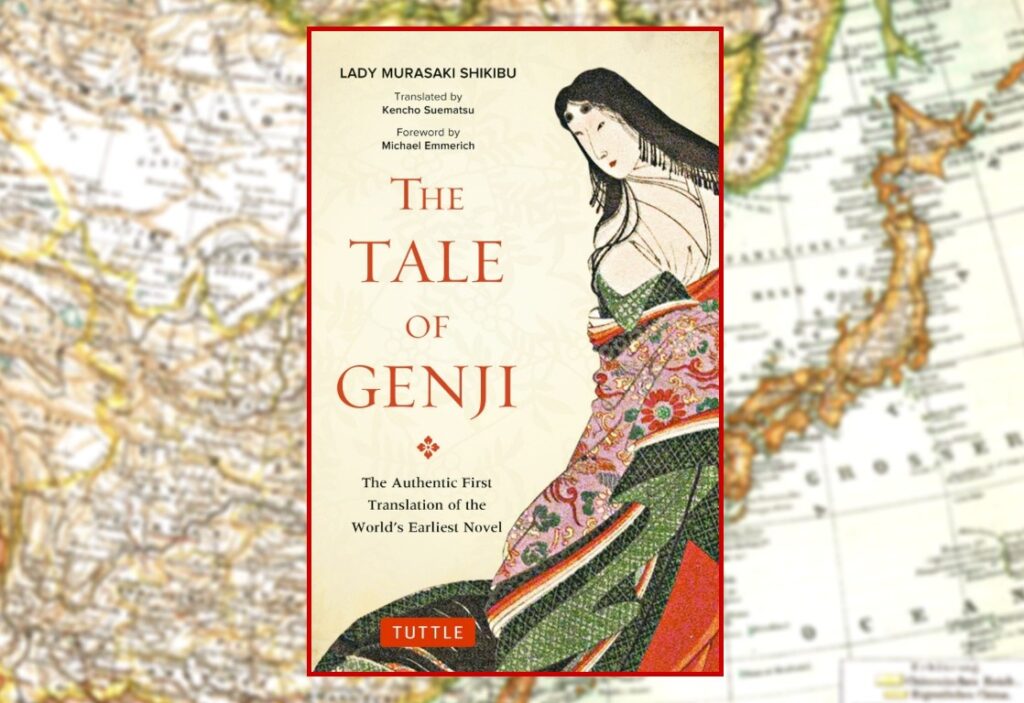
Editor’s note: And now for some relief in the riot and chaos — providing some historical perspective. I particularly like this quote from the book: “It seems that in a world of intrigue none dares do what is right for fear of risking his own interests.” When JS popped into the bookstore, The Tale of Gengi just jumped out at him. He attaches the following ‘review’.
A book review by Julius Skoolafish
“The noble mind that soars on high,
Beyond the star-bespangled sky:
Looks down with ease on depths that lie
A thousand fathoms ‘neath his eye.”
The Tale of Genji is reported to be the world’s earliest novel. It was written in the early 11th century by Lady Murasaki Shikibu. Born in 978, she was “a daughter of Tametoki of the Fujiwara clan”, and who “joined the entourage of Empress Akiko (Shōshi)”. Lady Murasaki‘s main character is Prince Genji.
[The Tale of] Genji has 54 chapters. The benchmark translation is by Arthur Waley in six volumes from 1925-1933.
- The Tale of Genji: A novel in Six Parts by Lady Murasaki – Translated by Arthur Waley (Vol One)
- https://archive.org/details/in.erne[unclear]t.dli.2015.182984/page/n2/mode/2up
The version I wish to share is the original (partial) translation in 1882 by Kencho Suematsu of 17 chapters. See the cover picture above.
One particularly relaxing way to read books is with the aid of an audio recording. By downloading the audio files and playing them through your favourite programme such as FTW (I am sure there are many others), this enables you to follow the text at a speed that is comfortable for you; the advantage is that you also get to hear the skilled reader pronounce those foreign names of characters, places and events with precision, especially when it involves a language like Japanese.
Here for example is a link to the Librivox recording of Genji (various readers by chapter)
All you need to know about the plot for now is summarised on the back cover:
“The Tale of Genji follows Prince Genji through his many loves, and varied passions.“
From the Introduction by the translator Kencho Suematsu
“The early death of her husband and her dissatisfaction with court life gave Lady Murasaki [Shikibu – the authoress] cause to turn to the truths of Buddhism and to watch the floating world about her with dispassionate yet observing eyes.“
With that last phrase I am already hooked, but it gets so much better …
From the authoress herself over 1000 years ago, speaking through her main character Prince Genji.
“Ordinary histories are the mere records of events and are generally treated in a one-sided manner. They give no insight into the true state of society. This, however, is the very sphere on which romances principally dwell. Romances are indeed fictions, but they are by no means pure inventions; their only peculiarities being these, that in them the writers often trace out, among numerous real characters, the best, when they wish to represent the good, and the oddest when they wish to amuse.”
Throughout the book we stumble across many aphorisms that ring true to our world today, such as on page 180
“It seems that in a world of intrigue none dares do what is right for fear of risking his own interests.”
Another insight into the sociopolitical awareness of Lady Murasaki is given on page 40:
“Public business can only be tranquilly conducted when the superior receives the assistance of subordinates, and when the subordinate yields a becoming respect and loyalty to his superior, and affairs are thus conducted in a spirit of mutual conciliation.”
[My mind immediately wanders to Catherine The Great’s philosophy of “benevolent despotism” – no doubt inspired by her reading of and communication with Voltaire, her contemporary.]
We also come across little gems by the translator in footnotes such as on page 185:
“In Chinese history it is recounted that a certain artful intriguer made a fool of his Sovereign by bringing a deer to the court and presenting it before the Emperor, declaring it to be a horse. All the courtiers, induced by his great influence, agreed with him in calling it a horse, to the Emperor’s great astonishment and bewilderment.”
Who didn’t immediately bring to mind Hans Christian Anderson’s “The Emperor’s New Clothes” and wonder how such fairy tales and mythical narratives are common to so many cultures?
And speaking of fairy tales, the reference to “The Bamboo Cutter [and the Moon-Child]” on page 217 takes us down a whole new path of wondrous diversion into Japanese Fairy Tales.
- Japanese Fairy Tales – Compiled by Yei Theodora Ozaki
- https://www.gutenberg.org/files/4018/4018-h/4018-h.htm
Audio files here depending on your mood …
One of the most striking features of sociohistorical note to emerge from reading Genji is the profound influence on Japanese imperial court life of Chinese art and culture. In parallel is the fact that Buddhism appears to have been axiomatic in terms of their belief system around the turn of the 11th Century. Buddhism (as well as references to Christianity) pervades all significant dates, ceremonies and festivals, as well as common superstitions dictating everyday behaviour and importantly, the belief in the concept of the afterlife.
Page 155 the character Lady Aoi has become gravely ill.
“He [Genji] tried to soothe her, and said “Pray, don’t trouble yourself too much about matters. Everything will come right. Your illness, I think, will soon pass away. Even supposing you quit this present world, there is another where we shall meet, and where I shall see you once more cheerful, and there will be a time when your mother and father will also join you.”
Genji speaking on page 76
“It is said that when one leaves this world without a single regret, one passes straight to Paradise.“
Translator’s footnote page 97
“According to the Buddhist’s doctrine of the Hosse sect, all the souls of the dead pass, during seven weeks after death, into an intermediate state, and then their fate is decided. According to the Tendai sect, the best and the worst go immediately where they deserve, but those of a medium nature go through this process.”
But for me, the pièce de résistance of The Tale of Genji lies in the use of the four-line poems called waka “which [from back cover] dance throughout this work, [earning] it a place as a classic text in the study of poetry.”
We see Genji and his friends engage in merry evenings where the prime activity is to exchange these spontaneous waka in a kind of debating game to ultimately determine a winner for the evening –scrabble hadn’t been invented yet, let alone ‘smart’ devices.
The opening quote concerning “The noble mind that soars on high” is a prime example of the wakas that “dance” through this novel.
On page 189, having been exiled for a period to a rather isolated place on the coast because of his social misdemeanors, Genji expresses his thoughts:
“Never thought I, in my younger day,
To be thrown on the wild sea-shore,
And like these figures to float away,
And perhaps see my home no more.”
Equally fascinating is how the characters use wakas to communicate formally with each other. In the waka, the second party [the female in this case] would me metaphorised as a flower and spoken to in third person.
On page 114 Genji leaves no doubt as to his feelings towards the Princess, Lady Wysteria:
“When will be mine this lovely flower
Of tender grace and purple hue?
Like the Wysteria of the bower
It’s charms are lovely to my view.“
But on page 129 Genji is not getting the response he is hoping for
“Not speaking is a wiser part,
And words are sometimes in vain.
But to completely close the heart
In silence, gives me pain.“
In another subplot one target of Genji’s love interest and affection sadly dies, leaving behind a daughter (Violet) whom Genji vows to take under his wing and raise. In this case the mother is the dead flower and the daughter is represented as a new bud (page 120).
“Though still a bud the violet be,
A still unopened blossom here,
Its tenderness has charms for me,
Recalling one no longer near.”
I could not think of a more appropriate quote to close this teaser with (Genji speaking):
“From my boyhood I paid much attention to reading and writing, and perhaps my father [the Emperor] noticed that I had benefited by these pursuits. He observed that ‘few very clever men enjoyed worldly happiness and long life’; perhaps because ability and knowledge are too highly valued to admit of other blessings”
And this from the mind of a Japanese woman writing the world’s first novel early in the “11th century after Christ”. There are so many more nuggets throughout Genji waiting to be savoured.






























Amazing information. Unfortunately too long a story for me to tackle.
From my days in high school I seem to remember in English lessons we were told that Anthony Trollop wrote the first novel. Just goes to show how wrong history can be. And how dangerous education can be at times.
Aussiemal – I’ll bet poor old Anthony didn’t take to using a dictionary much – going on his surname of Trollop.
Trollop – 1.slovenly woman, a slattern (now there is another word that needs attention!) 2. immoral woman, a prostitute.
Boy! With a surname like that, I would have been ducking for cover!
@nemesis, given that his surname was Trollope with an e,are we joking?
@skoolafish.why the quotes around eleventh century after christ?
uncomfortable with western civilisation and bc and ad too,are we?
you could always adopt the two-century old jewish scholarly habit of ce,common era,and bce,before common era.
i mean, just show your support of israel and multiculti by suppressing any mention of christ or the lord/dominus,right ? (IRONY OFF)
that will get you a job in humanities at an anglo university for sure.
“[tenth]/eleventh century after Christ” is a direct quote from the “Introduction by the Translator”, Kencho Suematso who also writes:
"On the whole my principal object is not so much to amuse my readers as to present them with a study of human nature, and to give them information on the history of the social and political condition of my native country nearly a thousand years ago [1880s].“
Aussiemal – see what happens when we pool efforts?
The writings of Anthony Trollope (1815-1882)
https://archive.org/details/writingsofanthon12trol
Thank you 😊
You write:
”Just goes to show how wrong history can be.”
We were also taught that Nicolaus Copernicus (1473-1543) was the sole originator of the heliocentric cosmological model for our solar system.
But we were never told about Nasir al-Din al-Tusi (1201 to 1274)
Thank you Dee – I wasn’t expecting you to post this but I sure hope readers get to enjoy and share in those hidden gems within ‘Genji’.
I just stumbled across the following guide which gives much more insight into this classic work.
The Conversation – Guide to the classics: The Tale of Genji, a 1,000-year-old Japanese masterpiece
https://theconversation.com/guide-to-the-classics-the-tale-of-genji-a-1-000-year-old-japanese-masterpiece-99848
Apparently we can pin the year of ‘publication’ down to 1008; in the full 54 chapter version there are some 400 characters and almost 800 four-line poems (wakas).
“Celebrating its millennial anniversary in 2008, The Tale of Genji (Genji Monogatari) is a masterpiece of Japanese literature. Completed in the early 11th century, Murasaki Shikibu’s elegant and enchanting prose spans 54 chapters, features some 400 characters and contains almost 800 separate poems. Many consider it to be the world’s first novel, predating most European texts by several hundred years.”
(I may not be able to respond to comments in a timely manner as I can’t post directly via Gumshoe and hence tick to received notifications – posting this via WordPress.)
Thank you for highlighting that particular quote in your Editor’s note, Dee. It falls into this category:
“The best moments in reading are when you come across something – a thought, a feeling, a way of looking at things – which you had thought special and particular to you. Now here it is, set down by someone else, a person you have never met, someone even who is long dead. And it is as if a hand has come out and taken yours.”**
― Alan Bennett, The History Boys
Julius, for example:
https://www.youtube.com/watch?v=5Z53RzmxBso
911 Entire Pentagon Footage with Missile Impact
https://www.bitchute.com/video/px9h9y48tG6i/
Here is another from left field, but staying with the Japanese theme:
“You can hide memories, but you can’t erase history.”
In “Colourless Tsukuru Tazake” by Haruki Murakami there is a dark, pivotal event which results in our main character (colourless) Tsukuru being unjustly and mercilessly ostracised from his very close group of (colourful) high school friends without explanation. It is only some 16 years later that circumstances arise and he summons the courage to pursue answers to why he was ostracised.
As Tsukuru retraces events and reacquaints with his old friends, Murakami paints wonderful word pictures of each of these main characters. [Spoiler Alert: one is now deceased.]
One word sums up Murakami’s work: “metaphorical”.
As the past is unravelled, we read at one point:
“Maybe there’s not much point in doing this now, but I wanted to clear up a misunderstanding.” Tsukuru said …**“The truth sometimes reminds me of a city buried in sand.“ Aka said. “As time passes, the sand piles up even thicker, and occasionally it’s blown away and what’s below is revealed.“**
[..] Tsukuru gazed at the face of his old friend …
**“You can hide memories, but you can’t erase history."** Tsukuru recalled Sara’s words and said them aloud.”
Comment:
You can hide [or confuse] memories, but you can’t erase history [the truth]. Indeed, that phrase could be the central theme of any discussion or debate about almost any aspect of ‘history’ [or indeed very current events !!] as we ‘know’ it.
After all,
“What is history but a fable agreed upon?”
Or as often stated …
“What is history but a series of lies agreed upon?”
https://quoteinvestigator.com/2016/07/05/fable/
Do right and fear no man.
https://www.youtube.com/watch?v=quuAw6HCZ-4
Fish , I clicked onto the first link & saw that there are 1159 pages of reading there.
Have you read the lot ?
If so, you’re a better man than I am – not that most GS readers hadn’t already come to that conclusion of their own accord .
1159 pages of Arthur Waley’s translation? No way!! Having bought the 17-chapter translation by Kencho Suematsu the Foreword by Michael Emmerich made me go searching – and that is how I found the Librivox audio files as well.
I have several books on the go but am not even close to being in Mary’s league.
My favourite word is tsundoku (in e-form).
Fish , I really liked that video you posted yesterday below the header titled :
‘ Liziqi – The life of potato ‘ .
A real treat . It makes one appreciate the simplicitys of life .
Yes, Liziqi condenses the science of traditional horticulture and her exquisite culinary skills into an elegant art form. Add to that how she exudes empathy in caring for her aging grandmother. Join the other 10.6 M subscribers and enjoy her channel.
I saw in interview with her somewhere (can’t put my fingers on that link) and she was promoted here.
https://www.youtube.com/watch?v=r6z_ia0L7Wc
Rules for Boys and Girls in this little one-room schoolhouse
Stay on topic (or, if you must do otherwise, write “Off topic”).
No fecal references on names.
Word limit 250 words, preferably less, so it does not drown out Little Jimmy.
Link limit 4. (I mean in comments, not in Julius’ article)
5.We have already heard the “Zio did 9-11” story, and the “Trump is our lord and savior” story several times; please run it past again, only if you have new info.
Pay Dee early and often.
With all the literature that gets tossed around on the internet, and all the ‘jew bashing that takes place by self appointed experts on the subject, I find it quite mind boggling that I can’t recall even once anyone ever mentioning ‘The Thirteenth Tribe’ by Arthur Koestler. It dates back to 1976 and I got to read it in 1985. I’ve just recently obtained my own copy just to jog my memory, Kevin Woodman
Aesop would roll in his alleged grave(did he coin “like sand through the hourglass so are the days…).
Like Truth, I couldn’t finish War and Peace, little alone Atlas Shrugged.
Rugby League, I can not use as an excuse, nowadays, as the beloved Bears were first made to sleep with the enemy before being killed wickerman style, their stolen lands stolen. Now that was a Greek Tragedy.
Percolate the grey matter you do JS.
Thank you Simon – the mind continues to boggle as to how much has been written that we have not read, let alone heard of. Each book we open is like lighting up one tiny pixel in a huge black screen. I haven’t even approached War and Peace, let alone Crime and Punishment, but The Brothers Karamazov (Dostoevsky) is now underway as are a couple of Solzhenitsyn’s works.
Like Aussiemal, when I read that Genzi is acclaimed as the world’s first novel, I immediately thought “Hey, what about of Homer?” – then recalled that The Iliad and The Odyssey and actually epic poems.
At least the Roosters fired last night – and that field goal was the match winner. Tedesco – temperature? – barred from plane at time of boarding even after training with his teammates all week? – and yet no corona testing for confirmation? WT_? What an absolute farce, and these men are being used as Pavlovian caged guinea pigs and made a spectacle of because of their high public profile. I can’t wait for a-re-run of The Running Man.
Thanks Julius for ‘the running man’ reference……. reminding me just as I am undergoing dental treatment. Now that has REALLY put up my blood pressure….. damm dentists!
( i take it that I have the film title correct……ouch)
Simon , I feel your pain . I went to the Rabbitohs march in 1999 & there were a lot of Bears fans there in solidarity .
The league is not the same without the Bears .